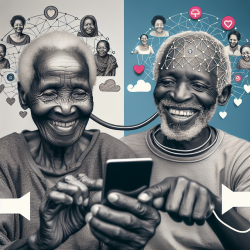Introduction
The COVID-19 pandemic has been a catalyst for many changes in our society, especially in how we perceive and address social isolation and loneliness. These issues have been particularly pronounced among older adults in Africa, where cultural and familial support systems were disrupted by pandemic restrictions. A recent scoping review titled COVID-19 experiences of social isolation and loneliness among older adults in Africa: a scoping review sheds light on these challenges and offers insights into coping strategies and policy gaps.
Understanding the Challenges
The review highlights that social isolation and loneliness (SI/L) among older adults in Africa were exacerbated by COVID-19 lockdowns, which severed traditional kinship-based care structures. The restrictions led to mental, communal, spiritual, financial, and physical health challenges. Older adults were particularly vulnerable due to weak government interventions and infrastructural disparities between urban and rural areas.
Key Findings and Implications
- Technology as a Coping Mechanism: While technology played a role in mitigating isolation, its adoption was hindered by digital divides, lack of infrastructure, and reluctance among older adults to embrace digital tools.
- Social Support Networks: Family, community, and religious groups provided crucial support, though these networks were strained. The role of government support varied significantly across countries.
- Research and Policy Gaps: The review identifies a need for more comprehensive research and policy frameworks to address SI/L, emphasizing the importance of integrated community care services.
Practical Steps for Practitioners
Practitioners can enhance their support for older adults by:
- Encouraging technology adoption through tailored training programs that consider the unique challenges faced by older adults.
- Facilitating community-based initiatives that strengthen local support networks, leveraging the role of religious and community groups.
- Advocating for policy changes that address the systemic gaps in mental health and social support services for older adults.
Conclusion
Addressing social isolation and loneliness among older adults in Africa requires a multifaceted approach that combines technology, community support, and policy reform. Practitioners have a vital role in implementing these strategies and advocating for necessary changes. By embracing these insights, we can transform isolation into a source of community strength and resilience.
To read the original research paper, please follow this link: COVID-19 experiences of social isolation and loneliness among older adults in Africa: a scoping review.










